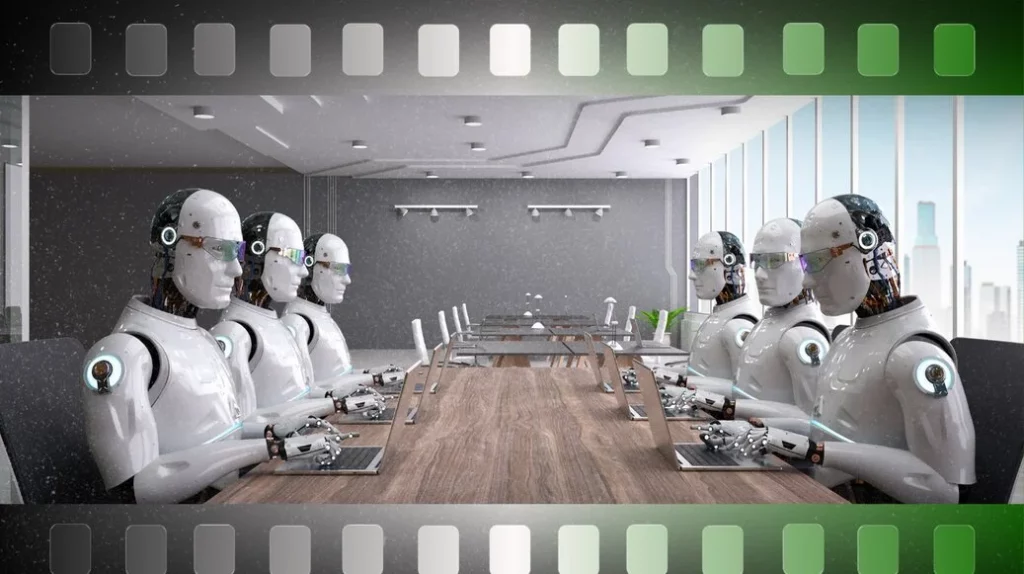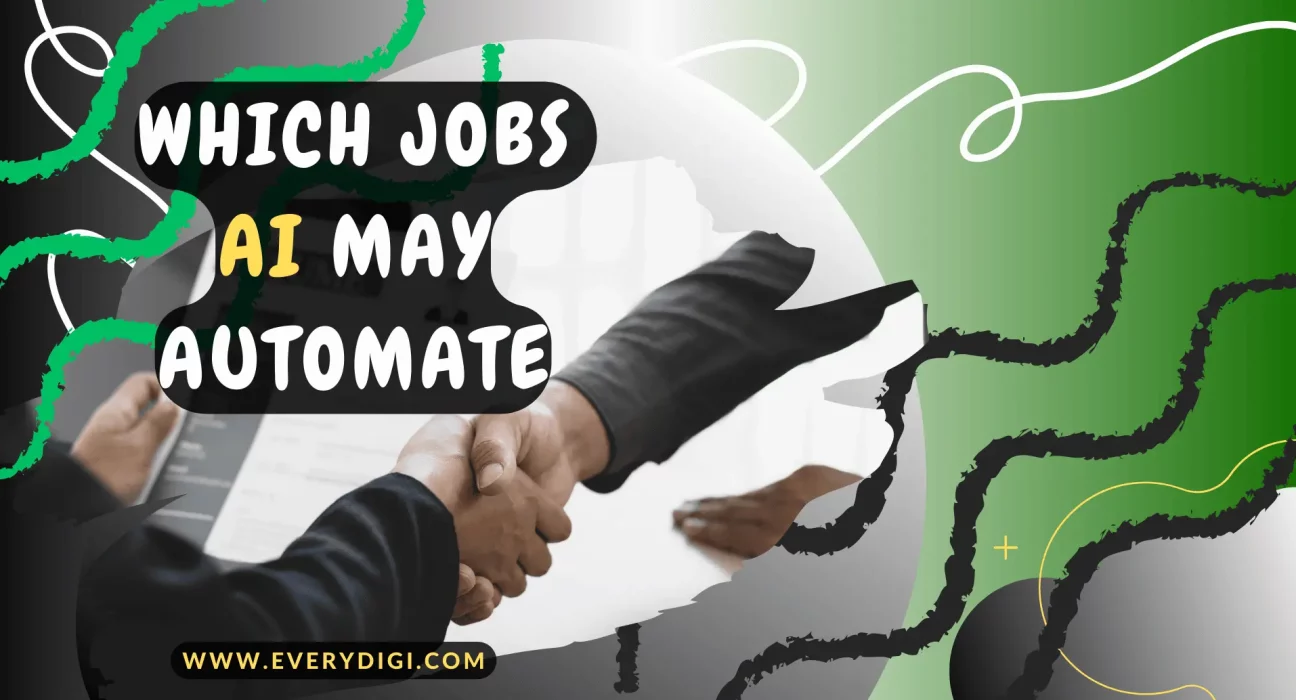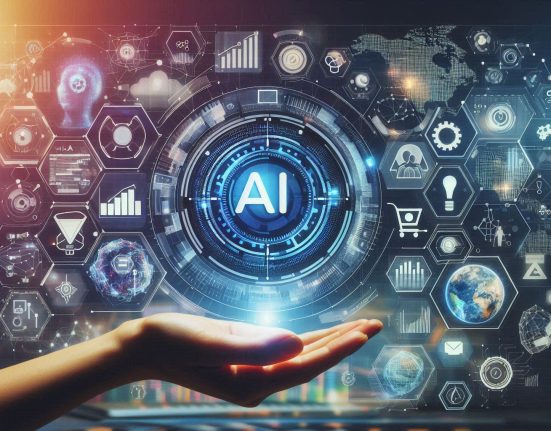In the age of AI, there is growing concern that automation and AI technologies will lead to significant job losses and transform the job market as we know it. However, this is not the full picture. While some jobs are at risk of being automated, AI technology also presents new opportunities for job creation and innovation.
In this article, we will explore the impact of automation on various job sectors and highlight the emerging opportunities in AI technology that can lead to new job creation. We will also examine the ethical implications of AI technology and the need for responsible deployment and use.
Key Takeaways:
- The Age of AI presents both challenges and opportunities for the job market.
- While some jobs are at risk of being automated, AI technology also presents new opportunities for job creation and innovation.
- Responsible deployment and use of AI technology is essential.
- Individuals and businesses need to adapt and capitalize on the evolving job landscape.
- Education and upskilling are essential for success in the Age of AI.
Understanding automation and AI
The rapid development of automation and AI technologies is transforming the job market, creating both challenges and emerging opportunities. Automation refers to the process of replacing human labor with machines or software, while AI involves the use of algorithms and advanced computing to simulate human intelligence and learning.
While automation and AI bring great benefits to businesses and industries, they also pose a significant threat to jobs that involve routine tasks. Many jobs are vulnerable to automation and AI replacing them. However, automation also provides new job opportunities in the tech industry and other areas that require skills in areas such as coding, data analysis, and machine learning.
What jobs are at risk of automation?
Not all jobs are equally at risk of being automated, but some are more vulnerable than others. Jobs that involve repetitive tasks, such as data entry, assembly line work, or bookkeeping, are most at risk. Other jobs that are highly vulnerable include call center operators, customer service representatives, and administrative assistants.
On the other hand, jobs that require social or emotional skills, creativity, or problem-solving are less likely to be automated. Examples of jobs that are relatively safe from automation include healthcare professionals, teachers, and artists.
Emerging Opportunities in AI
While automation may eventually replace some jobs, it has also opened up new opportunities.
In particular, the tech industry is booming with new job opportunities that require skills in areas such as coding, data analysis, and machine learning.
Businesses that can leverage AI to their advantage are also likely to thrive. Companies that use AI technologies to streamline operations or create entirely new business models are seeing significant growth and success. Entrepreneurs who can create successful AI-driven businesses are also likely to prosper.
Jobs at Risk of Automation

Automation and AI are transforming the job market, and some job sectors are more vulnerable to these changes than others. The following are just a few examples of jobs at risk of automation:
| Job Sector | Jobs at Risk of Automation |
|---|---|
| Manufacturing | Assembly line workers, machine operators |
| Transportation | Truck drivers, taxi drivers |
| Retail | Cashiers, sales associates |
| Food Service | Fast food workers, bartenders |
| Customer Service | Call center operators, receptionists |
Because they involve repetitive tasks that are simple for machines or AI to complete, these jobs are vulnerable to automation.
However, it’s important to note that not all jobs in these sectors are at risk. For example, in manufacturing, higher-level jobs such as engineers and designers are less likely to be automated.
What Can You Do?
If you work in one of these job sectors, it’s important to start thinking about how you can adapt your skills to remain employable in the Age of AI.
Consider gaining expertise in areas that are less likely to be automated, such as data analysis or programming. Alternatively, explore emerging opportunities in AI technology and see if there are ways you can leverage your skills to create new income streams.
“The best way to predict your future is to create it.” – Abraham Lincoln
By staying informed and staying ahead of the curve, you can ensure that you’re prepared to thrive in the changing job market.
Embracing AI in the workplace
The rise of AI technology provides a wealth of emerging opportunities for businesses to innovate and grow. By leveraging AI, companies can create new and exciting business models that were previously impossible.
One way to use AI to create a business is to develop AI-powered products or services. For example, a company that offers financial advice could leverage AI to analyze data and provide personalized recommendations to clients. Or, a company could use AI to develop a chatbot that interacts with customers and provides support 24/7.
Another way businesses can use AI is to automate repetitive or mundane tasks. This can free up employees to concentrate on more strategic and creative aspects of the business.
For example, a manufacturing company could use AI to automate quality control checks, allowing employees to focus on improving the production process.
Case Study: How AI Is Revolutionizing the Retail Industry
The retail industry is one that has seen significant disruption from AI technology. Emerging AI-powered solutions are providing retailers with powerful tools to analyze consumer data and create more personalized shopping experiences.
| Traditional Retail | AI-Driven Retail |
|---|---|
| Retailers rely on sales associates to provide product recommendations to customers. | AI-powered chatbots analyze customer data and provide customized recommendations to shoppers online. |
| Retailers struggle to accurately predict inventory demand, leading to overstocking or understocking of products. | AI algorithms analyze sales data and predict inventory demand, allowing retailers to optimize their supply chain and reduce waste. |
| Retailers rely on traditional shopping experiences to drive sales. | AI-powered virtual reality experiences create more immersive and engaging shopping experiences for customers, driving sales and increasing brand loyalty. |
These examples demonstrate how AI technology is transforming the retail industry, creating new business models and opportunities that were previously unimaginable.
As AI technology continues to evolve, businesses of all sizes and industries must find ways to embrace it in order to stay competitive and grow. By leveraging the power of AI, businesses can unlock new opportunities for innovation and growth, enabling them to thrive in the Age of AI.
The Rise of AI-based Startups
The emergence of artificial intelligence (AI) has created a new world of business opportunities. From chatbots to analytics, AI-enabled technologies are changing the way businesses operate. Entrepreneurs are increasingly leveraging AI to create profitable ventures and address complex problems.
Creating an AI Business
Creating an AI-based startup can be a lucrative way to make money with AI. One example of such a business is Grammarly, a digital writing assistant that uses AI to improve users’ grammar, style, and tone.
Another example is Hypergiant Sensory Sciences, a company that uses AI to solve problems in areas such as space, defense, and energy. The opportunities are endless, and the right approach can lead to a successful digital business.
The Advantages of AI-based Startups
The advantages of AI-based startups are numerous. Startups can use AI to disrupt traditional industries and create new business models. AI can help startups solve complex problems that were previously too expensive or impractical to address. Entrepreneurs can leverage AI to analyze data and gain insights that can inform business strategies and decisions.
The Challenges of AI-based Startups
Despite the benefits of AI-based startups, there are also challenges. Developing AI technologies can be time-consuming and costly. There is also a shortage of qualified AI talent, which can make it difficult to build the right team.
Additionally, startups must navigate ethical considerations and ensure the responsible use of AI in decision-making processes.
| Advantages | Challenges |
|---|---|
| Disrupt traditional industries | Time-consuming and costly development |
| Solve complex problems | Shortage of qualified AI talent |
| Analyze data and gain insights | Ethical considerations |
The Future of AI-based Startups
The future of AI-based startups is bright. With the increasing demand for AI-enabled technologies, the opportunities for entrepreneurs are vast. As AI continues to evolve and become more accessible, we can expect to see more innovative startups emerge in various industries.
- As AI technology advances, startups can expect to see more efficient and cost-effective development processes.
- The availability of open-source AI tools will make it easier for startups to build and deploy AI solutions.
- The emergence of AI-enabled platforms will provide startups opportunities to create cutting-edge products and services.
Overall, the rise of AI-based startups is a testament to the immense potential of AI technology. With the right approach, entrepreneurs can create successful businesses that contribute to a more AI-driven world.
Industries Poised for AI Transformation
As AI technology continues to evolve and advance, there are certain industries that are particularly well-positioned to benefit from its capabilities. These industries will be able to leverage emerging opportunities and novel business models to transform their operations and deliver better outcomes for customers and stakeholders.
Healthcare
The healthcare industry is one of the most promising sectors for AI transformation. With the ability to analyze vast amounts of data quickly and accurately, AI technologies can help healthcare providers diagnose diseases, predict patient outcomes, and improve treatment plans.
For example, AI-powered imaging tools can analyze medical images to identify potential health issues, while natural language processing (NLP) can read and analyze medical records to deliver real-time insights and recommendations.
Finance
The finance industry is also well-suited to benefit from AI technologies. With financial institutions handling large volumes of data daily, AI’s ability to quickly and accurately analyze data can help firms better manage risk, identify new investment opportunities, and improve overall decision-making.
For example, AI-powered chatbots can help financial institutions provide faster and more personalized customer service, while machine learning algorithms can detect fraudulent transactions and mitigate risk.
Manufacturing
AI technologies can also transform the manufacturing industry by enabling more efficient and cost-effective operations. With AI-powered robots and machines, factories can optimize production processes, reduce downtime, and improve product quality.
For instance, AI-powered predictive maintenance can foresee machine breakdowns before they happen, resulting in fewer production interruptions and increased productivity.
Transportation
The transportation industry is another sector that stands to benefit from AI technology. With the advent of self-driving cars and smart transportation systems, AI can help reduce traffic congestion, increase public safety, and improve overall efficiency.
For example, AI-powered traffic flow optimization systems can analyze real-time traffic data to create optimal routes for drivers, reducing road time and improving fuel efficiency.
As these industries continue to incorporate AI technology into their operations, we can expect to see significant changes in business models, job roles, and overall industry performance. It’s an exciting time to be part of the AI revolution, with emerging opportunities and new business models paving the way for a brighter future.
AI and Job Market Disruption
As we enter the Age of AI, there is growing concern about the impact of automation on employment. While AI technology offers exciting opportunities for new job creation, it also poses a risk to certain job sectors.
It’s essential to examine which jobs are most vulnerable to automation and how individuals can adapt their skills to remain employable or even make money with new opportunities.
Jobs at Risk of Automation
Several job sectors are at particular risk of automation, including manufacturing, transportation, and customer service roles.
The majority of automated jobs are those that involve routine tasks and are simple for machines or algorithms to complete.
| Jobs at Risk of Automation | Automation Probability |
|---|---|
| Telemarketers | 99% |
| Cashiers | 97% |
| Bookkeepers and Accounting Clerks | 98% |
| Assembly-Line Workers | 90% |
As the table indicates, jobs like Telemarketers, Cashiers, Bookkeepers, and Accounting Clerks, and Assembly-Line Workers have a high probability of being automated.
However, other industries like healthcare, finance, and education are still relatively insulated from the impact of automation and offer new opportunities for workers to explore.
The key to staying ahead of the job market disruption is to keep learning new skills and adapt quickly to emerging opportunities.
Embracing AI in the Workplace
While many fear the disruption AI will cause, others see it as an opportunity to innovate and create new business models. AI technology can be used in various industries to automate routine tasks, streamline business processes, and even create new forms of customer engagement.
Business leaders can explore ways to adopt AI technology by investing in research and development, partnering with other companies, and leveraging resources like incubators and accelerators.
Workers can also pursue training and certification programs to develop skills and knowledge that are in demand in the AI-driven job market.
Adapting to the New Job Landscape
As the job market evolves, individuals must adapt their skills to remain employable or create new income streams. They can explore new opportunities in emerging industries like AI, data analytics, and software development, or leverage their skills in creative sectors like design and marketing.
The rise of freelance and remote work also offers new opportunities for individuals to control their income streams and work on their terms.
As businesses adopt new technologies and new business models emerge, there are new avenues for workers to leverage their skills and create value.
It’s never been more important to stay informed, remain adaptable, and embrace the possibilities of the Age of AI.
The Role of Education and Upskilling
The Age of AI presents countless emerging opportunities for individuals and businesses to capitalize on. However, taking advantage of these opportunities requires specific skills and knowledge that may not have been necessary in previous job markets.
To remain employable or create new income streams, it is essential to prioritize education and upskilling in AI technologies.
Individuals looking to enter the AI job market should consider pursuing degrees or certifications in computer science, data analysis, machine learning, and other related fields.
Additionally, online courses and micro-credentialing programs can provide valuable training opportunities for those looking to learn specific AI skills.
AI-Specific Skills to Develop
- Programming languages such as Python, R, and Java
- Data visualization and analysis tools such as Tableau and Power BI
- Knowledge of machine learning algorithms and methodologies
- Understanding of natural language processing and computer vision
- Ability to work with big data and cloud computing
Moreover, businesses can also invest in upskilling their current employees in AI technologies. This can involve providing training programs and resources or partnering with educational institutions to offer AI-related courses.
Upskilling can also be an opportunity for individuals and businesses to create new income streams. Freelancing and consulting work in AI-related fields, such as data analysis or virtual assistant development, can be lucrative options for those with the right skills.
In addition, entrepreneurs can leverage their AI knowledge to create new digital businesses that can disrupt traditional industries.
Examples of AI-Driven Businesses
| Business | Description |
|---|---|
| Zest AI | An AI-powered lending platform that uses machine learning algorithms to help lenders make fair and accurate credit decisions. |
| Rulai | An AI-powered chatbot platform that helps businesses provide personalized and efficient customer service. |
| Ross Intelligence | An AI-powered legal research platform that uses natural language processing to help lawyers find relevant case law and statutes quickly. |
By prioritizing education and upskilling in AI technologies, individuals and businesses can position themselves for success in the Age of AI.
With the right skills and knowledge, it is possible to take advantage of the numerous emerging opportunities to make money with AI technologies and thrive in this new era.
Government Policies and AI Adoption
As the Age of AI continues to revolutionize the job market, governments around the world are grappling with how best to promote AI adoption and regulate its use.
The challenge lies in creating policies that encourage innovation and growth while also addressing concerns about job displacement and ethical considerations.
One way that governments are promoting AI adoption is by investing in research and development. This includes funding for academic research, as well as partnerships between industry and academia. For example, the U.S. government has launched the National Artificial Intelligence Research and Development Strategic Plan to coordinate federal investments in AI research and development.
Another way that governments are supporting AI adoption is by creating regulatory frameworks that address issues such as privacy, bias, and transparency.
The European Union’s General Data Protection Regulation (GDPR) is an example of such a framework, which regulates the use of personal data and requires companies to provide transparency in their use of AI algorithms.
Government Support for AI Business Models
Government policies can also play a critical role in supporting AI-powered business models. In some countries, such as China, the government is actively promoting the development of AI as a key economic driver. The Chinese government has designated AI as a strategic technology and has announced a plan to become a world leader in AI by 2030.
In the United States, the government has launched initiatives such as the Small Business Innovation Research program, which provides funding for small businesses to conduct research and development in high-tech areas such as AI.
In addition, the government has created a National AI Initiative Office, which is responsible for coordinating federal efforts to advance AI research and development.
Challenges and Opportunities
While government policies can help promote AI adoption and support business models, there are also challenges associated with implementing AI technologies. One major challenge is the potential for job displacement, particularly in industries that are vulnerable to automation.
Governments must work to address this issue by providing support and training for workers who may be affected by automation.
Another challenge is the ethical considerations surrounding AI, particularly in the areas of privacy and bias. Governments need to work with industry and academia to develop regulations and guidelines that ensure the responsible development and use of AI technologies.
Overall, the government’s role in promoting AI adoption and supporting business models presents both challenges and opportunities. With the right policies in place, AI has the potential to drive innovation and economic growth, while also creating new job opportunities and improving the lives of people around the world.
Ethical Considerations in the Age of AI
While AI technology promises many emerging opportunities for businesses and individuals to make money with AI, it also raises significant ethical considerations. As AI continues to become more integrated into our daily lives, it is essential to ensure that its development and deployment are ethical and responsible.
One key ethical consideration of AI is privacy. As AI systems collect and analyze vast amounts of data, there is a risk that personal information could be used for unintended purposes or fall into the wrong hands. It is crucial to implement robust privacy policies and data security measures to protect the privacy of individuals.
Bias is another critical ethical consideration in the Age of AI.
AI systems are only as unbiased as the data they are trained on, and there is a risk that biases could be amplified or perpetuated by AI systems. It is essential to ensure that AI systems are thoroughly tested for potential biases and to develop ethical guidelines for their use to avoid perpetuating existing societal biases.
The responsible use of AI in decision-making processes is also an ethical consideration. As AI becomes more advanced, it is increasingly being used to make decisions that have significant impacts on people’s lives, such as hiring decisions or loan approvals. Ensuring that these decisions are fair and transparent is crucial to avoid perpetuating societal inequalities.
As AI technology continues to advance, it is essential to establish ethical guidelines and regulations to ensure its responsible development and deployment. By doing so, we can harness the emerging opportunities of AI while mitigating its potential risks and ensuring a sustainable future for businesses and individuals to make money with AI.
Future Outlook and Predictions
The Age of AI is still in its infancy, but the impact of automation and AI on employment is already apparent. The adoption of AI technologies is rapidly increasing, and it’s predicted that more jobs will be created than lost in the long term.
A shift in the division of labor between humans and machines by 2025 could result in the loss of 85 million jobs, according to a World Economic Forum report. However, 97 million new roles may emerge that are more suited to the new division of labor between humans, machines, and algorithms.
There is also a growing trend in AI-based startups, and the potential for entrepreneurs to create new businesses using AI technologies is vast.
The digital business landscape is rapidly evolving, and those who can successfully leverage AI to their advantage will be the ones who thrive in this new era.
The future of AI is also reliant on ethical considerations, including the responsible use of AI in decision-making processes. There is a need for ethical guidelines and regulations to ensure the responsible development and deployment of AI.
The Potential of AI in the Job Market
AI technology has the potential to revolutionize the job market. It can automate repetitive tasks, freeing up employees to engage in more creative work. It can also provide insights and analysis that humans may not be able to discern, leading to better decision-making.
AI-driven businesses can also create entirely new business models, disrupting traditional industries and creating new opportunities for growth. Companies can leverage AI technologies to improve efficiency, reduce costs, and increase revenue.
The Need for Adaptation and Education
The key to remaining employable in the Age of AI is education and upskilling. It’s essential to stay informed about the latest AI technologies and trends to keep pace with the evolving job landscape.
Individuals must adapt their skills to the changing job market, and those who can successfully integrate AI technologies into their skillset will be in high demand. The ability to work with AI algorithms and understand their output is becoming an increasingly valuable skillset.
Conclusion
The Age of AI presents both challenges and opportunities for employment. As automation continues to impact various job sectors, individuals must adapt and embrace new technologies to remain employable or create new income streams.
The emergence of AI technologies has led to new business models and opportunities, and entrepreneurs can leverage these to their advantage by starting AI-driven businesses and making money with AI.
It is important to stay informed about the trends and predictions of AI technology and its impact on the job market. Education and upskilling are crucial in developing the skills and knowledge needed to thrive in an AI-driven job market. Additionally, ethical considerations must be taken into account to ensure responsible development and deployment of AI technology.
The government also has a role to play in promoting AI adoption and implementing policies to support the growth of AI-driven industries. As the Age of AI continues to evolve, it is important for individuals and businesses to stay ahead of the curve and capitalize on the emerging opportunities.








